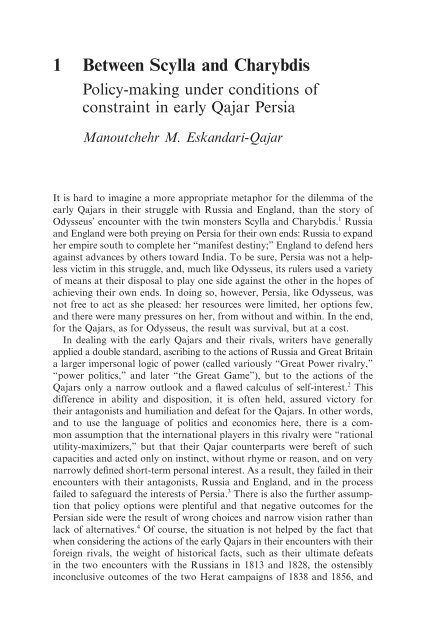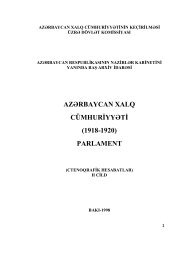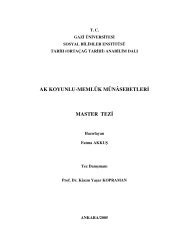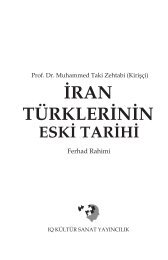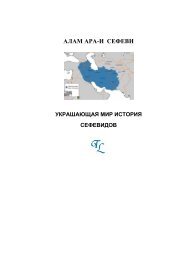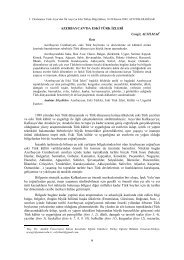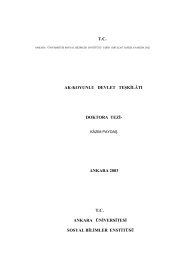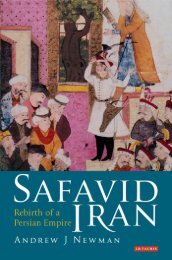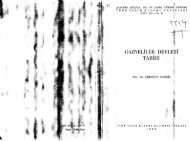War and Peace in Qajar Persia: Implications Past and ... - Oguzlar.az
War and Peace in Qajar Persia: Implications Past and ... - Oguzlar.az
War and Peace in Qajar Persia: Implications Past and ... - Oguzlar.az
- No tags were found...
You also want an ePaper? Increase the reach of your titles
YUMPU automatically turns print PDFs into web optimized ePapers that Google loves.
1 Between Scylla <strong>and</strong> CharybdisPolicy-mak<strong>in</strong>g under conditions ofconstra<strong>in</strong>t <strong>in</strong> early <strong>Qajar</strong> <strong>Persia</strong>Manoutchehr M. Esk<strong>and</strong>ari-<strong>Qajar</strong>It is hard to imag<strong>in</strong>e a more appropriate metaphor for the dilemma of theearly <strong>Qajar</strong>s <strong>in</strong> their struggle with Russia <strong>and</strong> Engl<strong>and</strong>, than the story ofOdysseus’ encounter with the tw<strong>in</strong> monsters Scylla <strong>and</strong> Charybdis. 1 Russia<strong>and</strong> Engl<strong>and</strong> were both prey<strong>in</strong>g on <strong>Persia</strong> for their own ends: Russia to exp<strong>and</strong>her empire south to complete her “manifest dest<strong>in</strong>y;” Engl<strong>and</strong> to defend hersaga<strong>in</strong>st advances by others toward India. To be sure, <strong>Persia</strong> was not a helplessvictim <strong>in</strong> this struggle, <strong>and</strong>, much like Odysseus, its rulers used a varietyof means at their disposal to play one side aga<strong>in</strong>st the other <strong>in</strong> the hopes ofachiev<strong>in</strong>g their own ends. In do<strong>in</strong>g so, however, <strong>Persia</strong>, like Odysseus, wasnot free to act as she pleased: her resources were limited, her options few,<strong>and</strong> there were many pressures on her, from without <strong>and</strong> with<strong>in</strong>. In the end,for the <strong>Qajar</strong>s, as for Odysseus, the result was survival, but at a cost.In deal<strong>in</strong>g with the early <strong>Qajar</strong>s <strong>and</strong> their rivals, writers have generallyapplied a double st<strong>and</strong>ard, ascrib<strong>in</strong>g to the actions of Russia <strong>and</strong> Great Brita<strong>in</strong>a larger impersonal logic of power (called variously “Great Power rivalry,”“power politics,” <strong>and</strong> later “the Great Game”), but to the actions of the<strong>Qajar</strong>s only a narrow outlook <strong>and</strong> a flawed calculus of self-<strong>in</strong>terest. 2 Thisdifference <strong>in</strong> ability <strong>and</strong> disposition, it is often held, assured victory fortheir antagonists <strong>and</strong> humiliation <strong>and</strong> defeat for the <strong>Qajar</strong>s. In other words,<strong>and</strong> to use the language of politics <strong>and</strong> economics here, there is a commonassumption that the <strong>in</strong>ternational players <strong>in</strong> this rivalry were “rationalutility-maximizers,” but that their <strong>Qajar</strong> counterparts were bereft of suchcapacities <strong>and</strong> acted only on <strong>in</strong>st<strong>in</strong>ct, without rhyme or reason, <strong>and</strong> on verynarrowly def<strong>in</strong>ed short-term personal <strong>in</strong>terest. As a result, they failed <strong>in</strong> theirencounters with their antagonists, Russia <strong>and</strong> Engl<strong>and</strong>, <strong>and</strong> <strong>in</strong> the processfailed to safeguard the <strong>in</strong>terests of <strong>Persia</strong>. 3 There is also the further assumptionthat policy options were plentiful <strong>and</strong> that negative outcomes for the<strong>Persia</strong>n side were the result of wrong choices <strong>and</strong> narrow vision rather thanlack of alternatives. 4 Of course, the situation is not helped by the fact thatwhen consider<strong>in</strong>g the actions of the early <strong>Qajar</strong>s <strong>in</strong> their encounters with theirforeign rivals, the weight of historical facts, such as their ultimate defeats<strong>in</strong> the two encounters with the Russians <strong>in</strong> 1813 <strong>and</strong> 1828, the ostensibly<strong>in</strong>conclusive outcomes of the two Herat campaigns of 1838 <strong>and</strong> 1856, <strong>and</strong>


